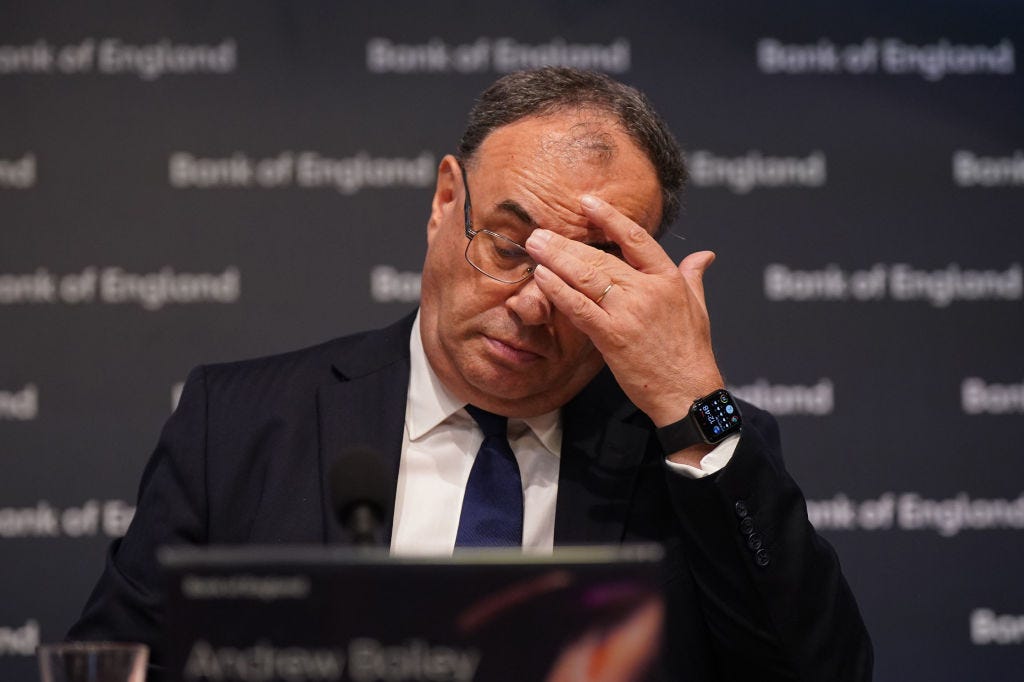Sorry to be gloomy part 2...
Where do we go from here + Stories I am tracking update + Summer book recommendations
Thanks for reading Off to Lunch. If this newsletter was shared with you please sign-up below to become a member. You will get Off to Lunch sent directly to your inbox, get full access to today’s newsletter and our Sunday press review, attend our events and contribute to the work of Off to Lunch
The first-ever edition of Off to Lunch was published on April 22 and was titled “Sorry to be gloomy”. You can read it again here. It covered how the chat in the City of London was that the economic outlook was worse than what the government, central banks and businesses were saying publicly at the time. There was mounting evidence about the hit to the economy from Russia’s invasion of Ukraine, Covid disruption to key factories and ports in China, falling consumer confidence and the fact that history suggested it would be unprecedented to get inflation under control without dragging down growth and causing unemployment to rise. I noted that the previous evening there had been a change in tone from Andrew Bailey, the governor of the Bank of England, who warned the Bank was “walking this very, very fine line” as it tried to tackle rising inflation. Bailey used the dreaded R word - recession - for the first time.
Well, three-and-a-half months later the world sadly looks a different place and this gloomy outlook has come to pass. The Bank yesterday forecast that the UK will fall into recession later this year and not emerge for 15 months. It also forecast that inflation will rise to more than 13 per cent by the end of this year and that household’s real post-tax income (the value of pay after inflation) will drop by 1.5 per cent this year and 2.25 per cent next, the biggest drop since at least the 1960s. Oh, and the Bank increased the base rate of interest by 0.5 percentage points - the most since it was granted independence in 1997 - to 1.75 per cent. At the start of the year the base rate was 0.25 per cent.
The Bank and Bailey have been heavily criticised this morning. The front page of the Daily Mail is a photo of a stressed-looking Bailey (the one at the top of this newsletter) next to the headline “Banker who’s running out of credit”. Alistair Osborne in The Times writes about how the government, the energy regulator Ofgem and the Bank have brought us “incompetence, incontinence and internecine warfare in roughly equal measures”. Ouch. You can read the Mail’s story here and Alistair’s comment here.
Bailey has been asked if he will resign in interviews today (he says he won’t, unsurprisingly). He has also insisted the Bank was not too slow to tackle inflation, claiming that external factors have changed dramatically in recent months - such as Russia invading Ukraine - and that if the Bank had moved any faster it would have damaged the economy’s recovery from Covid-19.


However, it is worth remembering that Andy Haldane, the former chief economist of the Bank, was warning about the threat posed by inflation from early 2021 and voted to stop quantitative easing (QE) bond purchases before the other eight members of the rate-setting monetary policy committee. Also, as early as February, four of the nine members of the monetary policy committee voted to increase rates by 0.5 percentage points but were out-voted by the five who wanted a 0.25 percentage point rise. Bailey was one of the five. In short, other economists thought that interest rates should have gone up earlier and faster than Bailey.
Having said this, there is also praise for the Bank today. John Authers and Mohamed A. El-Erian both back the Bank for being honest about the economic outlook. You can read Authers’ piece here (it amusingly describes the Bank of England as the Bank of Eeyore) while El-Erian’s piece is here. That second piece says the Bank’s announcement yesterday will go down in history, not because of the scale of the rise in interest rates, but “for the sort of analytical directness and intellectual honesty that seems to consistently elude other top central banks”. Another piece worth reading is Duncan Weldon’s Value Added newsletter. While Weldon describes the Bank’s forecasts as the “most grim set of forecasts I have ever seen from Threadneedle Street”, he reminds us that these forecasts are likely to be wrong because they assume no change in fiscal policy, ie no tax cuts or energy bill rebates by a new prime minister. So, when Liz Truss says a recession is “not inevitable” there is some truth to that - the government can do things to help. Nonetheless, some of the comments Truss made at the latest Sky News debate last night were, let’s say, optimistic. For example: “We can change the outcome and make it more likely the economy grows.”
One final thing, a point which brings us back to where we started today. Financial markets barely moved yesterday in response to the Bank’s announcement. The FTSE 100 rose 0.03 per cent, the FTSE 250 0.7 per cent and the pound rose about 0.1 per cent against the dollar. That is because this economic reality and these interest rate rises were already priced in - the Bank and Bailey are just saying it publicly now. Instead, attention in markets is turning to when inflation could peak or if it has already peaked. As I flagged in Wednesday’s Off to Lunch, the chief executives of big companies have been saying on calls with analysts and investors that they can see signs that inflation is easing and that consumer spending is holding up well (see a round-up of those comments here). That can be an optimistic note to finish on…



